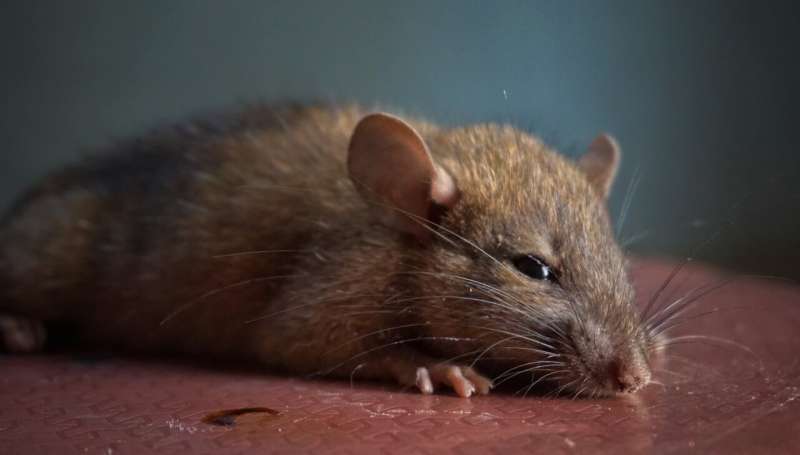This article has been reviewed according to Science X's editorial process and policies. Editors have highlighted the following attributes while ensuring the content's credibility:
fact-checked
trusted source
proofread
Intoxicated teenage rats wearing 'FitBites' found to experience sleep disturbance long after withdrawing from alcohol

Adolescent rats exposed to alcohol vapor experience persistent sleep disruption after withdrawal, as measured by Fitbit-like tracking devices, a new study has shown. The findings, published in Alcohol: Clinical & Experimental Research, provide insight into the relationship between sleep disturbance and heavy drinking in humans.
Although adolescents and young adults may be particularly affected by sleep disturbances associated with drinking, little is known about that connection or its mechanisms. Plausibly, the link between disrupted circadian rhythm and substance use may operate in both directions; for example, irregular sleep cycles, including daytime sleepiness, have been implicated in teen substance use.
Daytime sleepiness and disrupted activity in humans can be measured using wearable tracking devices, complementing EEG metrics taken at night. Nevertheless, genetic and lifestyle factors make the relationship between alcohol and sleep problems challenging to study in humans, and rodents offer a compelling alternative.
Scientists have used alcohol to induce insomnia in rodents, with outcomes suggesting that alcohol exposure can generate persistent changes in sleep resembling those in adults with alcohol use disorder (AUD) and other physiological and behavioral deficits in young adulthood. For the new study, researchers used a Fitbit-like device—a "FitBite"—to examine sleep and activity in rats exposed to alcohol as adolescents.
Investigators in California worked with 48 male and female rats. During adolescence, some rats were exposed to alcohol vapor over five weeks, reaching a blood ethanol concentration similar to that experienced by human teens while binge drinking. Rats in the control group were not intoxicated. The rodents' activity and circadian rhythms were measured using FitBites at three points: during intoxication, one day after withdrawal, and four weeks later.
Subsequently, 16 rats were implanted with EEG electrodes, so their FitBite and EEG data could be compared. The researchers used statistical analysis to evaluate the effectiveness of the FitBite in identifying sleep and activity cycles, in addition to shifts in the rats' activity.
Female rats were generally more active than male rats. Rest and activity, as measured via FitBite, correlated well with EEG measurements. When the rats were tested during intoxication, they were less active in the dark—when they would typically be most active—and more active in the light. Their circadian rhythm was also disrupted. One day after withdrawal and again four weeks later, the rats still had significantly less overall activity. Their daytime consisted of more activity episodes of shorter duration, though their nighttime activity had normalized, and the circadian rhythm disturbances were no longer observed.
The rats' ongoing fragmented rest and activity during daylight paralleled aspects of persistent sleep disruption in humans following heavy drinking. It is plausible that exposure to alcohol during adolescence causes changes in multiple brain circuits and neurotransmitters, helping to explain why alcohol-induced sleep disruption appears to alter circadian rhythms and may be a risk factor for AUD relapse.
Beyond that, the study showed that a Fitbit-like device can be successfully used in rats to assess rest and activity cycles, expanding the options for investigators. The study does not address self-administered alcohol nor the complex genetic and environmental factors contributing to rhythm disturbance and insomnia in humans.
More information: Cindy L. Ehlers et al, Use of a Fitbit‐like device in rats: Sex differences, relation to EEG sleep, and use to measure the long‐term effects of adolescent ethanol exposure, Alcohol: Clinical and Experimental Research (2023). DOI: 10.1111/acer.15079




















